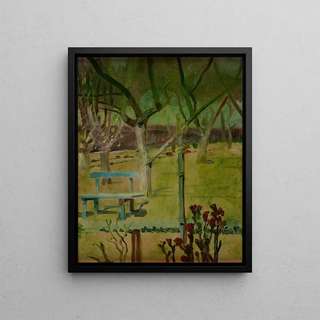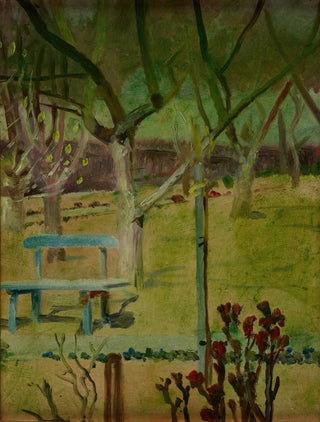Art print | View of the garden - Jacek Malczewski


View from behind

Frame (optional)
Art print of Garden View - Jacek Malczewski – Captivating Introduction
In the fascinating world of Polish art, the artwork "Garden View" by Jacek Malczewski stands out for its ability to capture the very essence of nature while evoking deep emotions. This painting, imbued with mystery and poetry, transports the viewer to a world where beauty and contemplation meet. Through this piece, Malczewski invites us to explore a garden that is not merely a physical space but also a symbol of serenity and escape. The soft light bathing the scene, delicate colors, and fluid shapes create an almost dreamlike atmosphere, conducive to reflection and escapism.
Style and uniqueness of the work
Jacek Malczewski's style is characterized by a unique fusion of symbolism and realism, giving "Garden View" a dimension that is both tangible and spiritual. The meticulously painted details, from lush foliage to vibrant flowers, reveal a deep love for nature and a particular attention to the beauty of forms. The composition of the artwork, subtly balanced, guides the viewer's gaze through the garden, inviting visual exploration that goes beyond a simple landscape. Every element of the canvas seems charged with meaning, as if Malczewski sought to tell a story, that of a refuge where the soul can rejuvenate. This approach, combined with a palette of harmonious colors, creates an atmosphere of harmony and peace, transforming the garden into a true sanctuary.
The artist and his influence
Jacek Malczewski, an emblematic figure of Polish art at the end of the 19th century, established himself as a master of symbolist painting. His career is marked by an unceasing quest for national identity and a desire to transcend artistic boundaries. Malczewski draws inspiration from mythology, literature, and Polish culture, integrating these elements into his works to create a dialogue between the past and the present. "Garden View" reflects this approach, where nature becomes a mirror of the human soul. His influence endures

Matte finish

View from behind

Frame (optional)
Art print of Garden View - Jacek Malczewski – Captivating Introduction
In the fascinating world of Polish art, the artwork "Garden View" by Jacek Malczewski stands out for its ability to capture the very essence of nature while evoking deep emotions. This painting, imbued with mystery and poetry, transports the viewer to a world where beauty and contemplation meet. Through this piece, Malczewski invites us to explore a garden that is not merely a physical space but also a symbol of serenity and escape. The soft light bathing the scene, delicate colors, and fluid shapes create an almost dreamlike atmosphere, conducive to reflection and escapism.
Style and uniqueness of the work
Jacek Malczewski's style is characterized by a unique fusion of symbolism and realism, giving "Garden View" a dimension that is both tangible and spiritual. The meticulously painted details, from lush foliage to vibrant flowers, reveal a deep love for nature and a particular attention to the beauty of forms. The composition of the artwork, subtly balanced, guides the viewer's gaze through the garden, inviting visual exploration that goes beyond a simple landscape. Every element of the canvas seems charged with meaning, as if Malczewski sought to tell a story, that of a refuge where the soul can rejuvenate. This approach, combined with a palette of harmonious colors, creates an atmosphere of harmony and peace, transforming the garden into a true sanctuary.
The artist and his influence
Jacek Malczewski, an emblematic figure of Polish art at the end of the 19th century, established himself as a master of symbolist painting. His career is marked by an unceasing quest for national identity and a desire to transcend artistic boundaries. Malczewski draws inspiration from mythology, literature, and Polish culture, integrating these elements into his works to create a dialogue between the past and the present. "Garden View" reflects this approach, where nature becomes a mirror of the human soul. His influence endures






